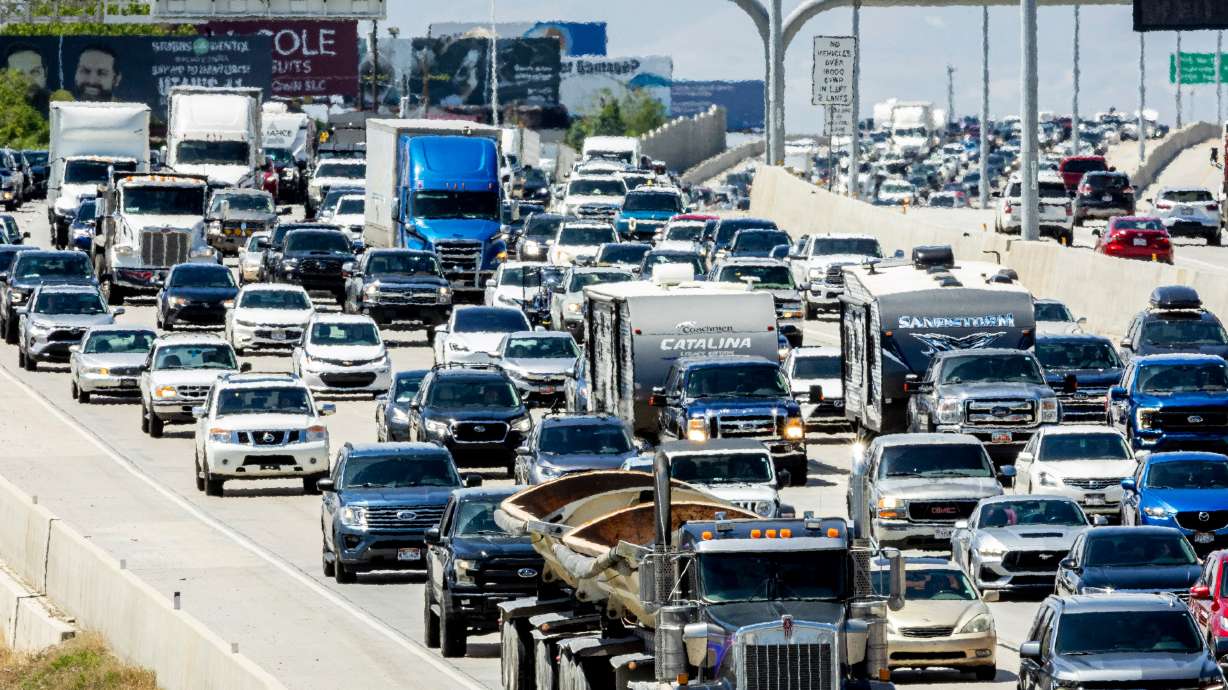- The Environmental Protection Agency proposed rolling back tailpipe emission standards created over public health concerns.
- Critics argue the rollback could make it difficult to regulate pollutants in the air.
- The new proposed rule will be open to public comment before it can be finalized.
WASHINGTON — The Environmental Protection Agency is proposing to roll back a 2009 finding that greenhouse gas emissions harm public health, a move widely criticized by environmental groups.
Specifically, the rule is aimed at tailpipe emission standards for cars and other vehicles.
By unraveling the finding, the action by the administration could tie the hands of future regulators when it comes to regulating pollutants that contribute to climate change, critics assert.
"Gutting vehicle pollution standards isn't just bad for our health and the climate, it's going to drive up costs for families and businesses," said Peter Huether, senior transportation research associate at the American Council for an Energy-Efficient Economy.
"Drivers would pay thousands of dollars more in fuel and maintenance costs over the life of a vehicle, and businesses could lose billions annually from higher trucking costs. These costs would ripple through the economy, raising prices for everyday goods and undercutting job growth."
The new proposed rule will be open to public comment before it can be finalized. A final rule would likely be challenged in court, Huether's group says.
If finalized, the move would strip the EPA of its ability to curb emissions under the Clean Air Act, according to opponents.

Christy Goldfuss, executive director of the Natural Resources Defense Council, said such a move flies in the face of recognizing extreme weather events that are fueled by carbon emissions.
"As Americans reel from deadly floods and heat waves, the Trump administration is trying to argue that the emissions turbocharging these disasters are not a threat. It boggles the mind and endangers the nation's safety and welfare," she said.
"The American people support commonsense action to address the pollution causing climate change, but the EPA is trying to abandon its responsibility to protect us from climate disasters. We need to act now to protect our families and the environment," she said.
She added that the administration's move to jettison these standards flies in the face of the Supreme Court's landmark decision directing the agency to follow the science.
"And the science is irrefutable: Continuing to spew greenhouse gases into the atmosphere will worsen climate impacts and endanger human health and welfare. Risks that seemed far in the future in 2009 are now everyday reality for millions of Americans," Goldfuss said.

A different view
On Tuesday, EPA Administrator Lee Zeldin announced that the EPA intends to rescind the finding, a step he described as "the largest deregulatory action in the history of the United States."
His agency said this "strikes a major blow" against intrusive regulation of industry.
The National Review reported that the Supreme Court, in a "dubious" 5-4 decision in Massachusetts v. EPA, ruled that Congress in 1970 meant to classify carbon dioxide as an "air pollutant" notwithstanding the fact that it is naturally present in the atmosphere and is exhaled by humans and animals.
The court required the EPA to provide a "reasoned explanation" for why it was not regulating "greenhouse gases." The Obama and Biden administrations each rushed to pile such regulations on the carmakers and the energy and manufacturing sectors, according to the EPA.
The EPA on its website said if the endangerment finding is rescinded, it means upending $1 trillion in "costly regulations" and is expected to save more than $54 billion annually.
"With this proposal, the Trump EPA is proposing to end 16 years of uncertainty for automakers and American consumers," Zeldin said.
"In our work so far, many stakeholders have told me that the Obama and Biden EPAs twisted the law, ignored precedent, and warped science to achieve their preferred ends and stick American families with hundreds of billions of dollars in hidden taxes every single year. We heard loud and clear the concern that EPA's GHG emissions standards themselves, not carbon dioxide which the finding never assessed independently, was the real threat to Americans' livelihoods."
American Trucking Association President and CEO Chris Spear commended the Trump administration and Zeldin for taking what he described as "decisive action" to upend the greenhouse gas rule.

"This electric truck mandate put the trucking industry on a path to economic ruin and would have crippled our supply chain, disrupted deliveries, and raised prices for American families and businesses," he said.
"Moreover, it kicked innovation to the curb by discarding available technologies that can further drive down emissions at a fraction of the cost. For four decades, our industry has proven that we are committed to reducing emissions. The trucking industry supports cleaner, more efficient technologies, but we need policies rooted in real-world conditions."









